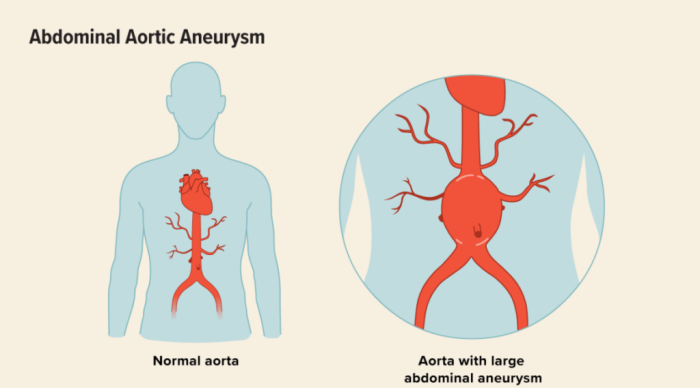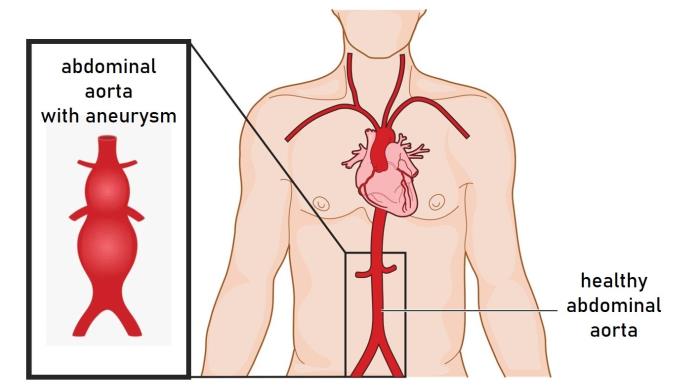Abdominal Aortic Aneurysm (AAA) is a serious condition characterized by the abnormal dilation of the abdominal aorta, which can lead to life-threatening complications if not detected and treated promptly. Recognizing the symptoms associated with AAA is crucial for early intervention, as many individuals may remain asymptomatic until the aneurysm becomes critical. This overview aims to illuminate the significance of understanding AAA, its common symptoms, and the role of medications in managing associated risks.
Overview of Abdominal Aortic Aneurysm: What Is It and Why Does It Matter?
An abdominal aortic aneurysm occurs when a section of the abdominal aorta weakens and bulges, increasing the risk of rupture. This condition is most prevalent among older adults, particularly men over the age of 65, and is often linked to risk factors such as atherosclerosis, hypertension, and a family history of vascular diseases. The potential for a life-threatening rupture makes it imperative to understand this condition, as early diagnosis and management can significantly improve outcomes and reduce mortality rates associated with AAA.
Common Symptoms of Abdominal Aortic Aneurysm
In many cases, AAAs develop without noticeable symptoms. However, when symptoms do occur, they may include a pulsing sensation near the navel, persistent abdominal pain, back pain, or discomfort in the sides of the abdomen. As the aneurysm grows or if it begins to rupture, symptoms may become more acute, presenting as sudden, severe pain in the back or abdomen, signs of shock such as rapid heart rate, low blood pressure, and even fainting. Recognizing these symptoms early can lead to prompt medical evaluation and intervention.

The Importance of Early Detection in Abdominal Aortic Aneurysm Management
Early detection of AAA is crucial, as the condition can progress rapidly and lead to serious complications if left untreated. Routine screening is particularly recommended for high-risk individuals, including older adults and those with risk factors such as smoking or a family history of the disease. Regular imaging studies, such as ultrasound or CT scans, can help identify the presence of an aneurysm before symptoms manifest, allowing for timely intervention that can significantly reduce the risk of rupture and associated morbidity and mortality.
Medications for Blood Pressure Control in Abdominal Aortic Aneurysm Patients
Managing blood pressure is a key component in the care of patients with AAA, as hypertension can contribute to the growth and potential rupture of the aneurysm. Various classes of medications are available to control blood pressure effectively, thus minimizing the risk of complications associated with AAA. Maintaining optimal blood pressure levels is essential for improving overall vascular health and reducing strain on the aorta.
Role of Beta-Blockers in Managing Abdominal Aortic Aneurysm Symptoms
Beta-blockers are often prescribed to patients with AAA to help manage blood pressure and reduce heart rate. By decreasing the force and rate of heart contractions, these medications lower the blood pressure within the aorta, which can help decrease the risk of aneurysm growth and rupture. Additionally, beta-blockers can alleviate symptoms associated with hypertension and improve overall cardiovascular function, making them a valuable part of the management strategy for AAA patients.
Antihypertensive Medications: Types and Benefits
A variety of antihypertensive medications are available to manage blood pressure in patients with AAA, each with unique mechanisms of action and benefits. These include ACE inhibitors, angiotensin II receptor blockers (ARBs), calcium channel blockers, and diuretics, among others. Each class works to lower blood pressure through different pathways, allowing healthcare providers to tailor treatment based on individual patient needs and responses. Effective blood pressure control is vital for patients with AAA, as it helps prevent further complications and supports long-term cardiovascular health.
Pain Management Options for Abdominal Aortic Aneurysm Patients
Effective pain management is crucial for patients with abdominal aortic aneurysms (AAAs), particularly for those experiencing discomfort related to the aneurysm or following surgery. Options include over-the-counter pain relievers like acetaminophen or nonsteroidal anti-inflammatory drugs (NSAIDs). For more severe pain, doctors may prescribe stronger medications, including opioids, but their use should be monitored closely to avoid dependence.
The Use of Statins in Abdominal Aortic Aneurysm Management: What You Should Know
Statins are commonly prescribed for AAA patients to manage cholesterol levels and reduce cardiovascular risk. They may help stabilize the aneurysm and slow its growth. Regular monitoring of lipid levels is essential to ensure effectiveness and adjust dosages as needed.
Understanding Anticoagulants and Antiplatelet Therapy
Anticoagulants and antiplatelet medications are critical in preventing blood clots in AAA patients, especially those who have undergone surgery. Anticoagulants, like warfarin or direct oral anticoagulants, reduce blood clotting, while antiplatelet drugs, such as aspirin or clopidogrel, prevent platelets from sticking together. Understanding these medications’ roles and their importance in post-operative care can improve outcomes.
Monitoring and Adjusting Medication: Importance of Follow-Up
Regular follow-up appointments are vital for monitoring medication effectiveness and adjusting treatment plans. Patients should have routine check-ups to assess their response to medications and address any side effects or complications. This proactive approach ensures optimal management of AAA and reduces risks.
Lifestyle Modifications to Complement Medication Therapy
In addition to medication, lifestyle changes can significantly impact AAA management. Adopting a heart-healthy diet, engaging in regular physical activity, quitting smoking, and managing stress contribute to overall health and may help stabilize or reduce aneurysm growth.
Potential Side Effects of Medications for Abdominal Aortic Aneurysm Management
While medications are essential for managing AAA, they can have side effects. Common side effects may include gastrointestinal issues, increased bleeding risk with anticoagulants, and muscle pain with statins. Patients should be aware of these effects and communicate any concerns to their healthcare provider.
The Role of Healthcare Providers in Medication Management
Healthcare providers play a critical role in the medication management of AAA patients. They assess the patient’s condition, prescribe appropriate medications, and monitor progress. Open communication between patients and providers ensures that treatment plans are effective and tailored to individual needs.
Alternative Therapies and Natural Remedies for Abdominal Aortic Aneurysm Symptoms
Some patients explore alternative therapies and natural remedies to manage AAA symptoms, including acupuncture, yoga, and dietary supplements. While some may find relief through these methods, it’s essential to consult with a healthcare provider before starting any alternative therapies to avoid interactions with prescribed medications.

Patient Education: Understanding Your Medications
Patient education is crucial in managing AAAs. Patients should understand their prescribed medications, including their purpose, dosage, and potential side effects. This knowledge empowers patients to adhere to their regimens and recognize any issues that may arise.
How to Recognize Changes in Symptoms That Require Attention
Patients should be educated on recognizing changes in their symptoms that warrant medical attention, such as sudden, severe abdominal or back pain, changes in bowel habits, or new signs of infection. Promptly addressing these changes can prevent complications and improve outcomes.
The Impact of Medications on Quality of Life for Abdominal Aortic Aneurysm Patients
Properly managed medications can significantly enhance the quality of life for AAA patients. By controlling symptoms and preventing complications, patients can maintain better overall health and engage in daily activities with greater comfort and less anxiety.
Real-Life Experiences: Managing Abdominal Aortic Aneurysm Symptoms with Medications
Hearing real-life stories from patients who have successfully managed their AAAs with medications can provide hope and practical insights. Many patients share how medication, alongside lifestyle changes, has allowed them to live fulfilling lives despite their diagnosis.
Life After Abdominal Aortic Aneurysm Surgery
Learn what to expect after undergoing surgery for an abdominal aortic aneurysm. This section highlights lifestyle modifications, follow-up care, and ongoing monitoring necessary for ensuring long-term recovery and preventing recurrence of the aneurysm.
Recognizing the Symptoms and Causes of Abdominal Aortic Aneurysm
Get informed about the symptoms and causes of abdominal aortic aneurysm. This section helps identify warning signs that may indicate the presence of an AAA and discusses common risk factors, empowering patients to seek timely medical attention.
Conclusion: A Comprehensive Approach to Managing Abdominal Aortic Aneurysm
Managing an abdominal aortic aneurysm involves a comprehensive approach that includes medication management, lifestyle modifications, and regular follow-up care. By staying informed and engaged in their health care, patients can improve their outcomes and enhance their quality of life.
Best Abdominal Aortic Aneurysm Hospitals in India
The Best Abdominal Aortic Aneurysm Hospitals in India are equipped with specialized vascular facilities and expert surgeons, offering comprehensive care from diagnosis through recovery for patients with aortic aneurysms.
Best Abdominal Aortic Aneurysm Surgeons in India
The Best Abdominal Aortic Aneurysm Surgeons in India are experts in vascular surgery, providing personalized care and advanced techniques to ensure effective aneurysm treatment and patient safety.
FAQ
What medications are commonly prescribed for managing AAA symptoms?
Common medications include statins for cholesterol management, antihypertensives to control blood pressure, and anticoagulants or antiplatelet medications to reduce the risk of blood clots.
How do beta-blockers help in managing AAA?
Beta-blockers lower blood pressure and reduce the heart's workload, which can help prevent further stress on the aorta and may slow aneurysm growth.
Are there any side effects associated with medications for AAA?
Yes, potential side effects vary by medication but may include gastrointestinal discomfort, increased bleeding risk with anticoagulants, and muscle pain with statins.
How often should medication regimens be reviewed for AAA patients?
Medication regimens should be reviewed at each follow-up appointment, typically every 3 to 6 months, or more frequently if there are changes in health status or medication effectiveness.
What lifestyle changes should accompany medication management for AAA?
Lifestyle changes include adopting a heart-healthy diet, maintaining a healthy weight, quitting smoking, engaging in regular physical activity, and managing stress effectively.
Explore the Best Heart Care Resources in India
Find some of the top cardiologist, surgeons and the best heart hospitals in India
Best Heart Hospitals in India
Choosing the right hospital is crucial for successful heart treatments. If you want to explore trusted options, check the list of Best Heart Hospitals in India offering world-class facilities, advanced cardiac care units, and experienced teams for both simple and complex procedures.
Best Cardiologists in India
Finding the right cardiologist can make a huge difference in early diagnosis and long-term heart health. If you are looking for the Best Cardiologists in India, see this curated list of experts who specialize in preventive care, interventional cardiology, and complex heart disease management. Check the full list Best Cardiologists in India.
Best Cardiac Surgeons in India
If you are planning for heart surgery and need top-level expertise, we recommend exploring the Best Cardiac Surgeons in India. These surgeons have a proven record in performing bypass surgeries, valve replacements, and minimally invasive heart operations with excellent outcomes.